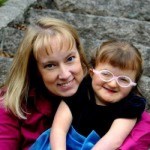November is National Caregivers Month, and the ONC salutes the over 90 million family caregivers in the United States for their often uncelebrated hard-work and tireless dedication to caring for loved-ones. Today, we celebrate one of those caregivers, Catherine Rose.
Dr. Catherine Rose has been a caregiver for the past 7 ½ years to her daughter Alexis, who was born prematurely with multiple complex conditions and requires care from over 40 professionals including pediatricians, a variety of specialists, and nutritionists. As a patient and reviewer in the ONC’s Blue Button Co-Design Challenge this past summer, she got the chance to share her unique perspective as a patient caregiver to inform and improve Blue Button-enabled health apps. Here, Catherine shares Alexis’s story with us.
ONC: Please tell us a bit about Alexis’s condition and the medical issues in her early years.
Catherine Rose: Alexis, whose twin passed away at 29 weeks, was born at 37 weeks weighing 4 pounds and not expected to live past a month. While in the neonatal intensive care unit (NICU), she did live past the first month, and the second, and today at seven years old she continues to beat the odds against intrauterine growth retardation diagnosis (IGUR). Still, her will to live and ours to support her hasn’t been easy. She was diagnosed with sleep apnea, has kidney problems, brain anomalies, and she still aspirates liquids – meaning they go into her lungs instead of her stomach. Additionally, she has had seven major surgeries – although none in the past three years.
ONC: Could you share what it takes for you to coordinate care for Alexis, who requires the care of 20 different specialists? What are your biggest challenges?
Catherine Rose: If a doctor doesn’t email, they will not be a part of our care team. When it comes to keeping my kid alive, I’m not concerned about patient confidentiality – I want the information emailed to me when I need it. I say that because I have kept an email folder since Alexis was 5 months old. That folder now has over 6600 emails in it that I use to stay organized and to be more accurate in sharing information with her large care team. This helps keep her care coordinated. For example, Alexis needs to eat by mouth and gain weight – that’s our goal. It’s complicated because making adjustments to her food intake involves us, the specialists at Children’s Hospital, her nutritionist, the pediatrician and the support team at her school. These people don’t interact with each other except through me, so I have to stay on top of things. Email and my own health mapping online helps me to stay organized in my interaction with Alexis’ care team.
ONC: Do all of Alexis’ providers and specialists have EHRs? Are you able to access information from them electronically via portals or sent directly to you?
Catherine Rose: Boston Children’s Hospital (BCH) is probably on the forefront of EHR adoption. The information I can get from their portal includes: Alexis’ blood work, which is very helpful; vital signs; what appointments we have, etc. This is great because we have a complex care coordinator who sometimes makes appointments on our behalf and we can contact doctors through the portal. Still, what I don’t currently have access to and what I would love are physician notes. I’d also like to have access to complete reports electronically rather than via snail mail ten months after we’ve had a visit. Finally, I would also love to be able to access her imaging results electronically rather than having to go in and ask for physical copies that I then have to scan and save.
ONC: For the providers without EHR systems, does it make it harder for you to coordinate care for Alexis?
Catherine Rose: Information is power, and we’ve seen firsthand the shift from paper records to EHR systems, because it’s happened within Alexis’s lifetime. Alexis bounced between different hospitals in the beginning, and it took us a year to figure out her blood potassium levels were the issue, because all her data wasn’t in the same place. It was up to me to get the different blood test reports and plot them, and send them to the kidney department. It was tedious, and if I hadn’t done that, Alexis might not be here.
My first time getting my patient-facing portal account was in 2009. Getting access to her blood work, vital signs, and messaging was a huge help.
ONC: Tell us about your experience as a judge on the Blue Button Co-Design Challenge.
Catherine Rose: I was both a patient co-designer and a judge, so I looked at all the submissions. What I saw was that some of the solutions were so focused on taking care of yourself as a patient that they didn’t really anticipate that caregivers might also want to log in and take care of another person. Some submissions were easy to navigate, others weren’t. GenieMD was very intuitive, and they were creating a community that I thought needed to be created. There are 45 people that Alexis could interact with on any given day that need real-time access to her health information. These complex processes bring along complex organizational and communication problems, but the solutions need to be really simple. A caregiver might only have five minutes between doctor’s appointments to take care of important things like prescription refills, and they want to be able to do it with just the click of a button on their phone.

ONC: If you had one message for your fellow caregivers what would it be?
Catherine Rose: Because so much of your time is spent with the person you’re caring for, it can be very isolating. Not much of your time is focused on you. I’d say, find someone else who is living the same life as you. It’s helpful if that person is a virtual friend, because then your interaction isn’t on a forced timeline. Finding a resource online is so helpful, to learn better practices and get support from other people out in the world. Finally, I will say use Health IT to help you get your act together and stay organized. Don’t be burdened by the papers. Free yourself of that so you can make time for you and the people around you.
Dr. Catherine Rose can be reached via Twitter @drcatherinerose.





